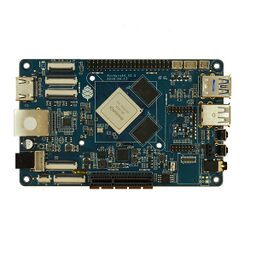NixOS on ARM/PINE64 ROCKPro64
| PINE64 ROCKPro64 | |
|---|---|

| |
| Manufacturer | PINE64 (Pine Microsystems Inc.) |
| Architecture | AArch64 |
| Bootloader | Upstream U-Boot |
| Boot options | microSD, eMMC, SPI NOR Flash |
The ROCKPro64 is a powerful single board computer built around the Rockchip RK3399 SoC.
There are two models of the board, with 2 or 4 GB of RAM. It can boot from an microSD card or an eMMC. It also has a 128 Mbit SPI flash that can be used to store the bootloader.
Status
This board has upstream U-Boot and kernel support, although the mainline kernel may still be missing some features. NixOS can be installed using manual partitioning and nixos-install or by modifying the aarch64 installation image as described in the next section.
U-Boot for this board is packaged in nixpkgs, and Hydra builds can be found here: https://hydra.nixos.org/job/nixpkgs/trunk/ubootRockPro64.aarch64-linux
Board-specific installation notes
You can use nixos-aarch64-images to get an rockpro64 compatible disk image or running the commands manually as described below:
U-Boot needs to be copied to specific sectors on the microSD card, eMMC or image with dd. Download/build U-Boot for the board, and write idbloader.img and u-boot.itb to the correct locations with (replace /dev/mmcblkX with the correct path to the card or image):
dd if=idbloader.img of=/dev/mmcblkX conv=fsync,notrunc bs=512 seek=64
dd if=u-boot.itb of=/dev/mmcblkX conv=fsync,notrunc bs=512 seek=16384
idbloader.img file. If that version is used, simply disregard the second command above.On many kernels, the ethernet driver cannot handle hardware check-summing of large packets, therefore this feature must be disabled for the ethernet to be stable. This can be done with the following NixOS configuration:
networking.localCommands = ''
${pkgs.ethtool}/bin/ethtool -K eth0 rx off tx off
'';
Serial console
The ROCKPro64 uses a GPIO pinout compatible with the Raspberry Pi 2 and newer. This means that the following pins can be used to connect a serial adapter:
| Pi-2 Bus | |
|---|---|
| Pin | Function |
| 6 | GND |
| 8 | UART0_TX |
| 10 | UART0_RX |
See https://wiki.pine64.org/wiki/ROCKPro64#GPIO_Pins for list of all pins
The serial console runs at 1500000 baud in the bootloader.
To connect check your `dmesg` for an identifier of the serial console:
``` [78635.965459] usb 2-1: new full-speed USB device number 8 using xhci_hcd [78636.119008] usb 2-1: New USB device found, idVendor=1a86, idProduct=7523, bcdDevice= 2.63 [78636.119017] usb 2-1: New USB device strings: Mfr=0, Product=2, SerialNumber=0 [78636.119022] usb 2-1: Product: USB2.0-Serial [78636.127103] ch341 2-1:1.0: ch341-uart converter detected [78636.142043] usb 2-1: ch341-uart converter now attached to ttyUSB0 ```
In our example that coresponds to the `ttyUSB0` which makes a new device available at `/dev/ttyUSB0` to which you can connect using for (example) `picocom`:
```
- Connect to /dev/ttyUSB0 at baud 1500000
picocom -b 1500000 /dev/ttyUSB0 ```
See https://wiki.pine64.org/wiki/ROCKPro64#Setup_a_Serial_Console_.28UART.29 for more information on setting up the serial console
Downstream kernel
Although the mainline kernel contains a device tree for the ROCKPro64, it does not seem to boot correctly as of 4.20. Therefore it is necessary to use a downstream kernel:
- ayufan-rock64/linux-kernel 4.4 based on Rockchip BSP
- ayufan-rock64/linux-mainline-kernel mainline based, with potentially fewer hardware features supported. This kernel is not based on a kernel stable branch, so it may have more bugs (unrelated to the hardware).
ramdisk_addr_r in the U-Boot console, or using upstream U-Boot. Custom NixOS Installer
It is possible to build a custom nixos installer image with a downstream kernel that will boot as-is on the rockpro64. For a working example see this repo: nixos-installer-rockpro64
Panfrost GPU Driver
The ROCKPro64's GPU is supported by the open source Panfrost driver. The downstream ayufan-rock64/linux-mainline-kernel is known to work. The mainline kernel may also work, but has not been tested. At the time of writing, support has been added to the required userspace libraries, but the changes have not yet been released. It is therefore necessary to build libdrm, mesa, mesa-glu and kmscube from their respective git sources.
